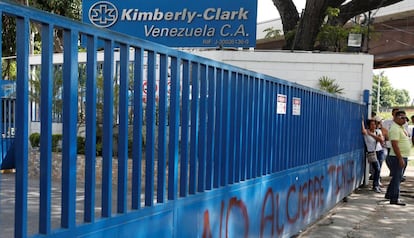Venezuela assumes control of US hygiene products factory
As well as Kimberly-Clark, a growing number of American companies are mulling ending operations amid worsening economic crisis

The Venezuelan government says it has taken over a factory run by Kimberly-Clark following the US company’s decision last week to suspend operations due to the worsening economic crisis in the South American country.
“From this Monday, Kimberly-Clark will be opening its doors, we are going to protect workers,” Oswaldo Vera, minister for labor social processes, told Venezuelan television channel Globovision.
By order of the president we are going to protect the workers of Kimberly-Clark Oswaldo Vera, minister for labor social processes
Kimberly-Clark produces lavatory paper, sanitary towels, disposable nappies and napkins, products that are increasingly difficult to find in a country suffering from shortages of all kinds, which often cause long lines outside supermarkets and pharmacies.
At the same time, US lender Citibank says it will close the accounts of the Central Bank of Venezuela and the Bank of Venezuela, used by the government of President Nicolás Maduro to make international transactions. Maduro described the move as a “financial blockade.”
Vera said that the decision to take control of Kimberly-Clark was in response to a request by workers at the plant, as well as on the orders of Maduro.
“On Friday, the company closed its doors throwing thousands of workers onto the streets, and by order of the president we are going to protect the workers of Kimberly-Clark,” he said.
“Today, the machines will start again to reactivate the company and begin production in Venezuela,” he said, adding: “Companies that are closed will be occupied and opened by workers with the government.”
Responding to the government’s decision, the company added: “If the Venezuelan government takes control of Kimberly-Clark’s installations and operations, it will be responsible for the well-being of the workforce, as well as its assets and machinery,” news agency Reuters reported.
On Sunday, Kimberly-Clark said it was suspending its operations in Venezuela indefinitely due to “the continuous deterioration of economic and business conditions,” according to US news channel CNN.
If the Venezuelan government takes control, it will be responsible for the well-being of the workforce Kimberly-Clark
“Today’s announcement is very difficult, particularly in light of the efforts of employees, who have worked diligently in the face of the challenges that exist to keep the business going,” concluded the company.
In May, the Coca-Cola Company announced it would be ending production in the country because of sugar shortages.
The economic situation in Venezuela continues to worsen, hitting imports of basic goods required for food and drink processing.
US companies such as PepsiCo, General Motors and Ford also face serious problems due to the continued devaluation of Venezuela’s currency.
The energy shortage has led to frequent and sustained blackouts throughout the country, prompting a breakdown of law and order, with riots in many areas of the country.
Sign up for our newsletter
EL PAÍS English Edition has launched a weekly newsletter. Sign up today to receive a selection of our best stories in your inbox every Saturday morning. For full details about how to subscribe, click here
The country has been hit hard by a drought that has seen water levels at the Guri dam’s Simón Bolívar hydroelectric power station, which produces 70% of the country’s power, fall drastically. Critics accuse the government, which took over the electricity sector in 2007, of mismanagement, failing to invest in alternative electricity generation and of corruption.They add that billions of dollars have been invested in the electric power industry in recent years to no apparent effect.
The government has sought to tackle the electricity shortages by reducing the working week to two days, as well as extending public holidays.
Venezuela’s opposition says that the only way out of the crisis is through a change of government. It has called on Maduro to stand down, as well as for a recall referendum to formally depose him. It has already gathered more than 1.1 million signatures to support the referendum.
English version by Nick Lyne.
Tu suscripción se está usando en otro dispositivo
¿Quieres añadir otro usuario a tu suscripción?
Si continúas leyendo en este dispositivo, no se podrá leer en el otro.
FlechaTu suscripción se está usando en otro dispositivo y solo puedes acceder a EL PAÍS desde un dispositivo a la vez.
Si quieres compartir tu cuenta, cambia tu suscripción a la modalidad Premium, así podrás añadir otro usuario. Cada uno accederá con su propia cuenta de email, lo que os permitirá personalizar vuestra experiencia en EL PAÍS.
¿Tienes una suscripción de empresa? Accede aquí para contratar más cuentas.
En el caso de no saber quién está usando tu cuenta, te recomendamos cambiar tu contraseña aquí.
Si decides continuar compartiendo tu cuenta, este mensaje se mostrará en tu dispositivo y en el de la otra persona que está usando tu cuenta de forma indefinida, afectando a tu experiencia de lectura. Puedes consultar aquí los términos y condiciones de la suscripción digital.








































